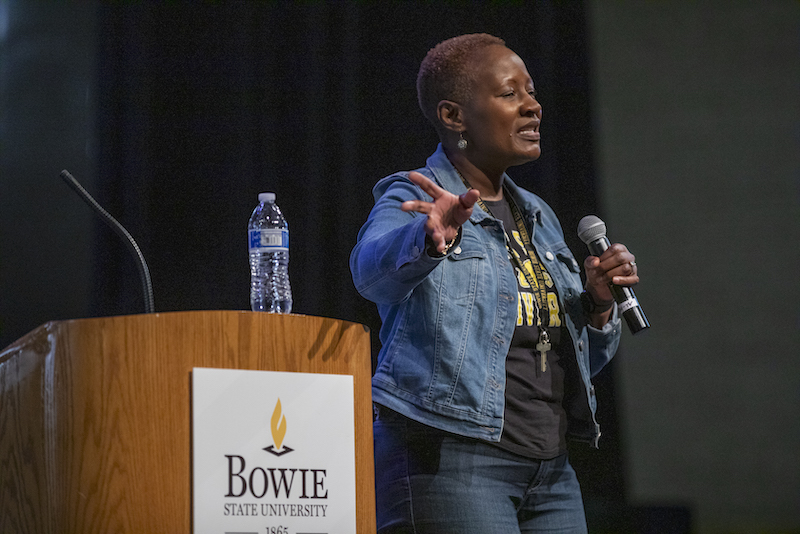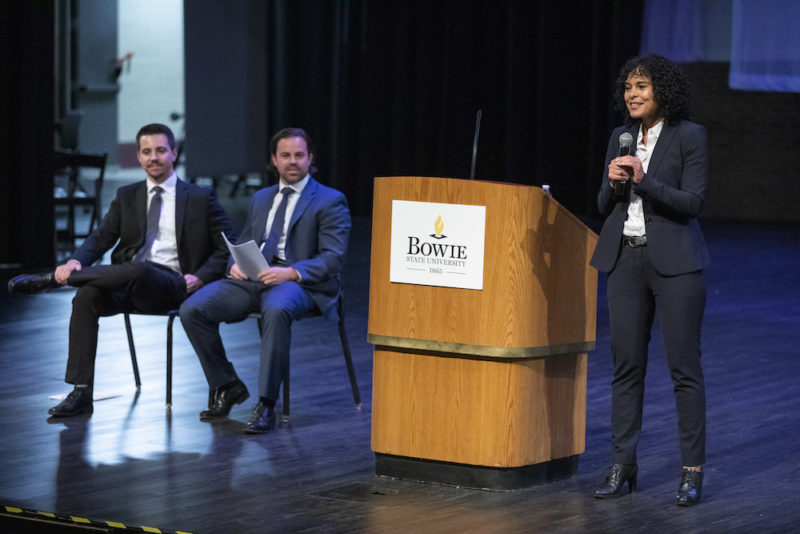Three Federal Bureau of Investigation (FBI) special agents from area field offices came to Bowie State University on Friday, armed with the promise of opportunity for students interested in helping them combat the cybercrime facing the United States.
The over 100 students in question journeyed to the historically Black university, located near DC in Prince George’s County, Maryland, from area high schools and colleges. The special agents, who currently serve the FBI as cybercrime investigators and researchers, presented to these students as part of a special event for educating young people about cyber careers at the FBI and National Security Agency. The event was hosted by Bowie State’s Department of Computer Science, whose chair, Rosemary Shumba, also spoke.

Rosemary Shumba, chair of Bowie State University’s computer science department, speaks to students at an event about cybersecurity professions. (Courtesy photo)
Presenting agents told students about various cybersecurity specialties, including computer science, data analysis, intelligence analysis, digital operations, IT, victim outreach and forensic analysis. But right now, they said, the agency especially needs computer scientists and data analysts. The FBI can help a little with upskilling for these roles: Through its Honors Internship Program, the law enforcement agency offers qualified applicants a paid 10-week internship. Most undergraduate and graduate students who complete this program, which requires top-secret clearance (even if not all roles involve such classified material), are offered a position with the bureau at some point. Salaries can begin at $83,000 and rise to over $130,000 with five years of employment.
The prospect of this path to employment impressed students like Joseph Keller, a Bowie State student majoring in computer science.
“I’m inspired,” he told Technical.ly. “I think there’s this illusion the FBI is this huge, unattainable job. Now, [employment with the agency] seems more possible.”
What the FBI wants – and needs — from students
According to the presenting officials, the FBI (like much of the country) needs cyber talent to help fight some major crimes.
Special Agent Scott Gillis, a member of the Baltimore field office’s cyber unit, reported that just one theft category alone — business email interdiction — is costing companies about $300 million per month. Through this act, criminals gain access to corporate email accounts and push their phony emails while supposedly representing the company’s financial partners. The criminal email elicits actual employees to provide sensitive company account information.
The FBI requires students trying to tackle these problems via the Honors Internship Program to be 18 or older, with a GPA of at least 3.0. Interns who want to qualify for top-secret clearance must not have used any criminalized drugs, including cannabis, for a whole year before applying; They must also pass a polygraph test and undergo an intensive background check with references.
In the interim, agents encouraged students to improve their chances by focusing on STEM subjects. While their resumes needn’t shine with stellar achievements, students were advised by agents to show problem-solving and critical thinking skills. For instance, one agent explained how an internship candidate distinguished themselves with a simple mathematical formula that helped their boss at a grocery store calculate how much produce to purchase each week. The candidate went on to get an FBI internship.
Presenting agents ultimately told students about various cybersecurity specialties, including computer science, data analysis, intelligence analysis, digital operations, IT, victim outreach and forensic analysis. But right now, they said, the agency especially needs computer scientists and data analysts.
The FBI, like many entities, appears interested in building this workforce with people from underrepresented groups. That the FBI made this presentation at Bowie State impressed junior computer science major and Cambridge, Maryland narrative Jermia Travers.
“I’m actually considering working for the FBI now,” she said. “I think if I work really hard I can get [there]. It seemed like they were really trying to get to us. It could be a diverse place.”

This editorial article is a part of Tech + Government Month 2022 of Technical.ly's editorial calendar. This month’s theme is underwritten by Spotify. This story was independently reported and not reviewed by Spotify before publication.
Join our growing Slack community
Join 5,000 tech professionals and entrepreneurs in our community Slack today!
Donate to the Journalism Fund
Your support powers our independent journalism. Unlike most business-media outlets, we don’t have a paywall. Instead, we count on your personal and organizational contributions.





